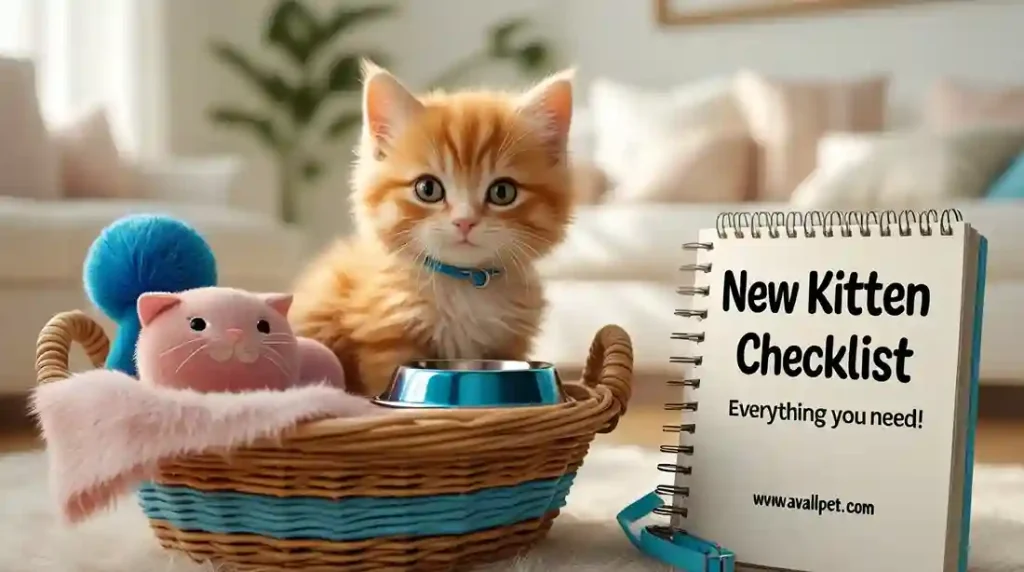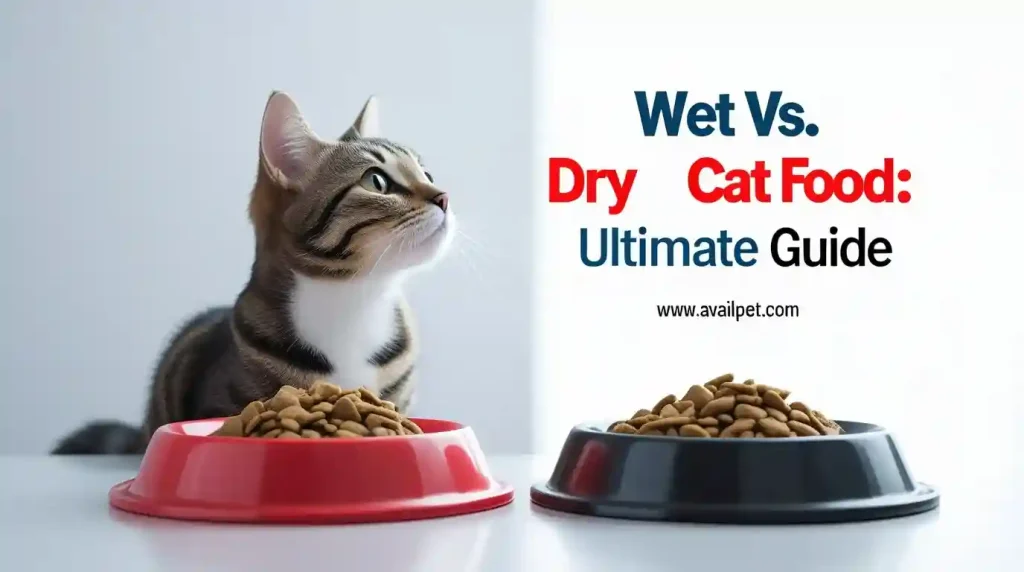The sound of your cat’s meow can be endearing—until it becomes a constant, piercing soundtrack to your day. If you’re finding yourself asking, “Why is my cat meowing constantly?”, you’re not alone. This behavior is one of the most common yet complex issues covered in our guide to Common Cat Behaviors, and it can quickly shift from charming to concerning. Is your cat simply being demanding, or could this be a genuine cry for help?
Understanding the root cause is the first and most critical step toward restoring peace and quiet to your home and ensuring your cat’s well-being. This guide will help you decode the noise and find a real solution.
Key Takeaways: Quick Reasons for Constant Meowing
Before we dive into the details, here are the most common reasons your cat won’t stop meowing:
- Attention-Seeking: The most common cause; your cat has learned that meowing gets them what they want.
- Hunger or Thirst: A primal demand, especially potent around scheduled feeding times.
- Medical Alert: Underlying pain, discomfort, or illness (like hyperthyroidism) is a primary cause. A sudden change in vocalization always warrants a vet visit.
- Stress & Anxiety: Changes in the household, boredom, or a lack of routine can trigger persistent, anxious meows.
- They’re in Heat: Unspayed females will produce loud, persistent, and distinctive yowling to attract mates.
- Cognitive Decline: In senior cats, constant crying, especially at night, can be a sign of feline cognitive dysfunction (dementia).
The 6 Main Reasons for Constant Meowing
1. “Hello!” & Attention-Seeking Behavior
Cats are smart, and they quickly learn what works. If your cat meows and you respond with pets, play, or even just talking to them, you’ve just rewarded the behavior. This can create a cycle where your cat meows constantly simply to get your attention. It’s important to distinguish a single, friendly “greeting meow” when you come home from persistent, demanding cries that continue until they get what they want.
2. The Dinner Bell Chorus: Hunger & Begging
This is one of the most common and easily recognizable triggers. If your cat’s excessive meowing happens primarily around their scheduled feeding times, they are likely reminding you—quite insistently—that the bowl is empty. This is a powerful, primal instinct. Some cats can even develop a habit of begging for food or treats, regardless of whether they are actually hungry.
3. An Underlying Medical Problem (The Vet Visit Essential)
This is the most critical reason to take constant meowing seriously. When a cat is in pain, feels disoriented, or is suffering from an illness, they often vocalize more. Common medical conditions linked to increased meowing include:
- Hyperthyroidism: An overactive thyroid gland, common in older cats, which speeds up their metabolism and can make them restless and vocal.
- Hypertension (High Blood Pressure): Often linked to other illnesses and can cause distress.
- Pain: From conditions like arthritis, dental disease, or an injury.
- Vision or Hearing Loss: As cats age, sensory decline can make them feel confused and anxious, leading to more crying.
E-E-A-T Callout: A sudden, significant increase in vocalization is a primary reason to schedule a veterinary appointment immediately. It is never a good idea to assume a new behavior is “just behavioral” without first ruling out a medical cause.
4. Stress, Anxiety, & Boredom
Cats are creatures of habit, and changes to their environment or routine can be a major source of stress. This anxiety often manifests as constant meowing. Common stressors include:
- A move to a new home.
- The arrival of a new family member (a baby, roommate, or partner).
- The introduction of a new pet.
- A lack of mental stimulation and environmental enrichment (boredom).
5. They’re in Heat (For Unspayed Females)
If you have an unspayed female cat, her constant meowing will likely follow a cyclical pattern. When she is in heat (estrus), she will produce a very specific, loud, and persistent yowl or cry. This is her way of advertising her availability to any male cats in the area. This behavior is often accompanied by restlessness, affectionate rubbing, and a characteristic mating posture.
6. Feline Cognitive Dysfunction (Senior Cats)
Similar to dementia in humans, older cats can experience a decline in cognitive function. A common symptom of Feline Cognitive Dysfunction (FCD) is increased vocalization, particularly at night. They may meow as if disoriented, lost, or confused, even in their familiar home environment.
What to Do: A Step-by-Step Guide to Quieter Days
Dealing with a cat that meows constantly requires patience and a systematic approach. Follow this step-by-step guide to address the behavior effectively and compassionately.
Step 1: The Vet Visit – Rule Out Medical Issues
This is not just a step; it’s the foundation. Before you try any behavioral fixes, you must eliminate medical causes. Schedule a comprehensive check-up with your veterinarian. Explain the change in vocalization and any other symptoms you’ve noticed. This is the only way to rule out painful conditions like hyperthyroidism, arthritis, or dental disease.
Step 2: Become a Feline Detective – Identify the Trigger
Keep a simple log for a few days. Note:
- When does the meowing happen? (e.g., 5 AM, when you’re on the phone, at night)
- Where are you and the cat?
- What happened right before the meowing started?
- What did you do when they meowed?
This log will reveal patterns and help you identify the specific trigger, whether it’s hunger, attention-seeking, or anxiety.
Step 3: Stop Rewarding the Noise – Ignore Demand Meowing
This is tough but crucial. If you’ve confirmed your cat is healthy and the meowing is for attention, you must stop reinforcing it.
- Do not look at, talk to, or pet your cat when they are meowing demandingly.
- Wait for a moment of quiet, even just a few seconds, and then immediately give them the attention they crave. This teaches them that silence is what gets rewarded.
Step 4: Enrich Their Environment – Cure Boredom
A bored cat is a noisy cat. Provide mental and physical stimulation:
- Scheduled Playtime: Use a wand toy for two 15-minute sessions daily to simulate hunting.
- Puzzle Feeders: Food puzzle toys make your cat work for their food, providing mental exercise.
- Create Vertical Space: A sturdy cat tree by a window gives them a territory to survey.
- Rotate Toys: Keep a few toys out at a time and rotate them weekly to maintain novelty.
Step 5: Ensure All Basic Needs Are Met
Sometimes the solution is simple. Perform a quick “well-being check”:
- Is the water bowl full and fresh?
- Is the food bowl clean and filled according to their schedule?
- Is the litter box impeccably clean?
- Is their sleeping area safe and comfortable?
What NOT to Do
Your instinctual reactions can sometimes make the problem worse. Avoid these common mistakes:
- Do Not Yell or Punish: This will only make your cat fearful of you and increase their overall anxiety, potentially worsening the meowing.
- Do Not Give In: If you eventually respond after 10 minutes of constant meowing, you’ve just taught your cat that they need to meow for 10 minutes to get what they want. You’ve rewarded the persistence.
- Do Not Assume It’s “Just Behavior”: As emphasized, never dismiss a sudden or dramatic increase in vocalization without a professional veterinary opinion. Your cat’s health is the priority.
FAQs About cat meowing constantly
Why does my cat walk around the house meowing?
This is often a sign of disorientation, boredom, or anxiety. They might be “patrolling” their territory or looking for something (like you, a toy, or a comfortable spot). In senior cats, this can be a sign of cognitive decline.
Why has my older cat started meowing constantly?
Increased vocalization in older cats is very common. The primary causes to investigate are pain from arthritis, hyperthyroidism, high blood pressure, or feline cognitive dysfunction (dementia). A senior blood panel and vet exam are essential.
My cat meows constantly at night, what should I do?
Nighttime meowing is often due to a lack of activity during the day. Ensure your cat has plenty of play and a feeding session right before your bedtime to tire them out. For senior cats, this can be linked to cognitive decline, so a vet check is crucial. Ignore the nighttime meowing (if medically cleared) to avoid reinforcing the behavior.
Should I ignore my cat when it meows for food?
Yes, if it’s outside of their scheduled feeding time. Feeding a cat when they meow teaches them that meowing works. Instead, stick to a strict feeding schedule and consider using an automatic feeder to break the direct association between you and the food source.
Conclusion
Dealing with a cat that meows constantly can test your patience, but it’s a solvable problem. The path to quieter days always starts with a trip to the veterinarian to rule out underlying medical issues. From there, patience, consistency, and a focus on rewarding quiet behavior will help you and your feline friend find a new, more peaceful way to communicate.
Understanding vocal cues is just one part of speaking “cat.” Once you’ve addressed the constant meowing, you can explore other fascinating behaviors, from the silent affection of the cat’s slow blink to the mysterious compulsion behind why cats knock things off tables.
Sources
- American Association of Feline Practitioners (AAFP). (2022). Feline Behavior Guidelines.
- Landsberg, G., Hunthausen, W., & Ackerman, L. (2013). Handbook of Behavior Problems of the Dog and Cat (2nd ed.). Elsevier.
- International Cat Care. (2023). Vocalisation – when is it a problem?
Cornell Feline Health Center. (2022). Feline Hyperthyroidism.






